
Section 6. United Nations and its specialized agencies
United Nation’s 75th Anniversary
On 24 October, UN celebrates its 75th anniversary. It was created at the end of World War II in an attempt to maintain international peace and security and to achieve cooperation among nations. Four months after the San Francisco Conference ended, the United Nations officially began, on 24 October 1945, when it came into existence after its Charter had been ratified. UN is commemorating its 75th anniversary amidst huge upheaval affecting the whole world, which is aggravated by an unprecedented global health crisis fraught with serious economic and social consequences. Are we able to overcome this upheaval? Are we ready to work together? Or lack of faith in each other and inability to get together will not let us do this? 2020 should be the year of dialogue to discuss shared priorities and ways to build a better future for all.
In January 2020, the United Nations launched the global consultation to mark its 75th anniversary. Over one million respondents from all UN Member States and Observer States have thus far taken part in the consultations, including through representative polling of 50,000 people in 50 countries. Through surveys and dialogues, it asked people about their hopes and fears for the future – representing the UN’s most ambitious effort to date to understand expectations of international cooperation and of the UN in particular. The results are presented in the report “UN75: The Future We Want, The UN We Need”.
On 21 September, Member-States held a high-level event to mark the UN’s 75th anniversary, and to adopt a forward-looking political declaration that will be negotiated through an intergovernmental process on: “The future we want, the United Nations we need: reaffirming our collective commitment to multilateralism”.
6.1. General Assembly
The General Assembly (GA) occupies a central position as the chief deliberative organ of the United Nations. It is comprised of all Members of the United Nations, each having one vote. It is authorized to discuss full spectrum of issues covered by the Charter. The UNGA meets on September each year.
The theme of the 75th Session is “The Future we want, the United Nations we need: reaffirming our collective commitment to multilateralism – confronting COVID-19 through effective multilateral action”. Video recordings of the country leaders' speeches were broadcasted live.
Statements from Central Asian countries at the general debate of the UNGA 75th Session

Address by the President of the Republic of Kazakhstan
The emphasis must be shifted on the root causes, preventive measures, and increasing the efficiency of our limited resources
H.E. Kassym-Jomart Tokayev, President of the Republic of Kazakhstan, called for the prevention of trade protectionism and political nationalism in times of pandemic, and for avoidance of politicization of vaccine development. He suggested that the idea of a network of Regional Centers for Disease Control and Biosafety under the UN auspices should be closely examined. Kazakhstan stands ready to host such a regional center. “The whole world is on the verge of dramatic upheavals that may lead to irreversible consequences. Lack of mutual confidence, misunderstanding of international competition, trade wars and sanctions really undermine the prospects and hopes for a better world…” underlined the President. In the post-Cold War world, the global society missed the chance to build a truly just, people-centered international system.
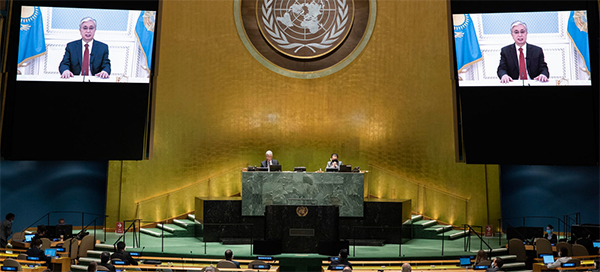
Sustainable Development Goals. The next 10 years are critical for implementing 2030 Agenda. “The very basic target, zero hunger is to be provided unconditionally […]. We should renew our commitment to leave no one behind, especially women, youth, children, elders, persons with disabilities, disproportionately affected by the crisis. The largest disruption of education systems in history should be stopped from becoming a generational catastrophe. Civic engagement and private sector involvement are also critical for solving current pressing problems. During past months we have witnessed strong solidarity all over the world through volunteering. To acknowledge the role of volunteers, I propose the United Nations to proclaim an International Year of Mobilizing Volunteers for Development. In Kazakhstan I announced the current year as a Year of Volunteers”.
Erosion of the Nuclear Non-Proliferation Regime. “Kazakhstan has been the role model of a responsible state by willingly abandoning its nuclear arsenal and shutting down world’s biggest nuclear test site. However, continuous erosion of the non-proliferation regime leaves us in a dangerous position… That is why we urge all P5 countries to ratify the respective Protocols to the Nuclear-Weapon-Free-Zone Treaties, including Semipalatinsk Treaty”.
Climate Change. “Another existential crisis for our civilization is the climate change. It is not only a dangerous problem in itself, but is also a “threat multiplier”. The climate emergency is a race we are losing. But the post-COVID recovery gives us unique opportunity to put environmental protection at the forefront of international agenda. We must unite around the UN’s six climate positive actions. Kazakhstan is very vulnerable to the various effects of the climate change. The tragedies of Aral Sea and Semipalatinsk Nuclear Test Site, the rapid melting of glaciers, and desertification threaten not only Kazakhstan and Central Asian region, but also the entire world. Although Kazakhstan is highly dependent on fossil fuels and has a long way to go to meet Paris 2030 targets, our commitment to develop a decarbonized economy has no alternative. We will reduce our greenhouse gas emissions by 15% by 2030 through economic overhaul and industrial modernization. And yet, in next five years we will plant more than two billion trees […]”.
Regional Cooperation. […] “Regional cooperation has always been our main focus and commitment. Central Asia is undergoing rapid transformation through significant expansion of regional cooperation in various fields. No doubt that a prosperous, strong and united Central Asia is beneficial both for regional and global stakeholders. As to regional stability, the rational use of transboundary water resources is instrumental. We thus propose the establishment of a Regional Water and Energy Consortium. To coordinate development agenda in the region we intend to institutionalize a UN-led regional SDGs Center in Almaty […]”.

Address by the President of the Kyrgyz Republic
We are actively engaged in a regional high-level dialogue platform to address existing problems
President of Kyrgyzstan H.E. S. Jeenbekov spoke on climate change, melting glaciers, shrinking water resources, and the need to develop green economy, raised problems related to the coronavirus pandemic, and underlined the importance of regional cooperation.
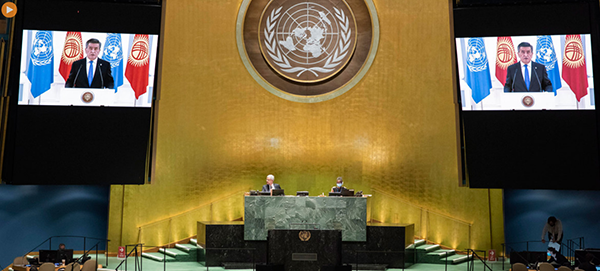
Coronavirus Pandemic and External Debt. […] “The pandemic impedes the implementation of the 2030 Agenda and has greatly exacerbated the external debt crisis. I would like to express my gratitude to the G20 and international financing institutions for the decision to suspend debt payments. We also ask you to support our proposal for a deep restructuring of external debt in exchange for sustainable development projects. We count on the active support of our initiative […]”.
Developing Clean Energy and Combating Climate Change. […] “The Kyrgyz Republic is committed to attaining the 7th and 13th Sustainable Development Goals. Last November, we ratified the Paris Climate Change Agreement. The Kyrgyz Republic sees the development of green economy as an important step in implementing these commitments. We are endeavoring to become a country with environmentally clean production and clean energy. Kyrgyzstan intends to gradually lower the use of traditional energy sources. We consider it important for us to use our hydroenergy potential through the building of hydroelectric plants and participation in the CASA-1000 international project. This will help to save water resources for the irrigation needs of our neighbors and for sustainable development of the entire region. The Kyrgyz Republic needs in support of the international community to adapt to the negative consequences of climate change”.
Water Resources, Ecosystem Development and Biodiversity Conservation. “Climate change reduces glaciers and water resources in the Kyrgyz Republic. This could lead to a shortage of freshwater, could pose a threat to public health, land degradation and economic risks. In this context, we advocate for the implementation of those projects which are aimed at studying the issue of glacier melting and protection. We also think it very important to preserve the mountainous ecosystems in those areas where glaciers form. To this end, the Kyrgyz Republic has launched a number of global initiatives. We have conducted two Global Forums on protecting snow leopard and its mountainous habitat. We passed a resolution on the role of the international community to prevent the threat of radiation in Central Asia. In August last year, the Group of Friends of Mountainous Countries was created. Today it has 23 countries in its ranks. It is also important to safeguard biodiversity. Therefore, Kyrgyzstan at this present UN Session put forward a new draft resolution “Nature Knows No Borders: Cross-border Cooperation is a Key Factor in the Preservation and Sustainable Use of Biodiversity”. We hope that there will be support to our initiative”..
Regional Cooperation. “The Kyrgyz Republic attaches special importance to regional cooperation in Central Asia. Cooperation amongst our countries is developing and developing dynamically. We actively participate in the regional dialogue platforms at the highest level in order to resolve the existing issues. One of the main goals here is to removing barriers to economic cooperation in order to ensure that we enhance the well-being of our peoples. Of vital importance for us is developing a system of transport and communication corridors, logistical hubs and terminals. We need to restore the main axes that existed in the ancient Great Silk Road. The building and the launching of the China-Kyrgyzstan-Uzbekistan railroad will be a meaningful contribution into linking Asia and Europe […]”.

Address by the President of the Republic of Tajikistan
…The countries of the region are concerned with the shifts in the hydrological cycle
In his speech, the President of Tajikistan H.E. E.Rahmon outlined the main challenges the country faces, such as terrorism and drug trafficking, climate change, and the economic consequences of the pandemic.
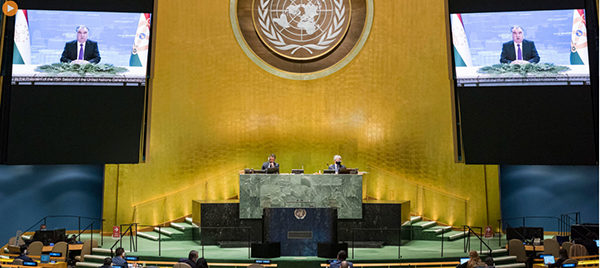
Pandemic and Economy. The COVID-19 outbreak has had a significant impact on the Republic of Tajikistan. The government, in close cooperation with WHO and other partners, has launched a major effort to prevent the spread of the infectious disease and to help those who are infected. The damage to the economy in 2020 alone has been estimated at US $2 billion.
Security. “Terrorist and extremist groups pose tremendous challenge to national security, seriously jeopardizing stability in different regions of the country.” It is extremely important for Tajikistan to cooperate with international organizations, including UN, CIS, SCO, and CSTO, in the field of counterterrorism. Tajikistan is ready to share its experience in combating terrorism, drug trafficking and peaceful conflict resolution. In this context, the country nominated its candidacy for the first time for a non-permanent seat in the UN Security Council for 2028 – 2029.
Tajikistan welcomes UN’s Peacekeeping Operations. Tajik police forces are involved in the UN peacekeeping operations in Darfur, South Sudan and the city of Abey of Sudan.
Peace Process in Afghanistan. Tajikistan shares almost 1,400 km of border with Afghanistan. The Afghan case has no military solution and Tajikistan indeed welcomes the peace-building negotiation processes and supports any approach aimed at addressing political crisis in this country.
Sustainable Development Goals. […] “We have ten years left until the end of the 2030 Agenda and its SDGs. The international community has made a significant progress in this direction over the past five years. However, the economic and financial indicators of the countries and severe negative consequences of COVID-19 call into question the timely implementation of SDGs, particularly in developing countries. The repercussion of the COVID-19 will also negatively affect our country, which is one of the proactive members of the global community in implementing the 2030 Agenda […]”.Tajikistan was one of the first countries to adopt its 2030 National Development Strategy and present its National Voluntary Report.
Climate Change. “Over the past sixty years, the average annual temperature in Tajikistan has increased by one degree. It has resulted in increased number of days with heavy precipitation and intensity of natural hydro-meteorological phenomena, which have year after year been affecting all countries throughout the world. Tajikistan, with 93% of its territory covered by mountains, bears losses equal to hundreds of millions of dollars annually as a result of water-related disasters. Such natural disasters often cause casualties. The areas of glaciers located in our country which are essential for all Central Asia have noticeably decreased over the recent decades. One thousand out of thirteen thousand glaciers located in Tajik mountains have melted away so far. This happens although when up to sixty percent of Central Asia's water resources are formed in the territory of Tajikistan. This year, due to low precipitation in winter, we have seen a significant decline in water stock in the region’s rivers, which in turn led to low-water during the irrigation season and caused a severe drought. This situation causes a negative impact on quantity and quality of safe drinking water, as well as on all water using sectors, particularly agriculture and energy. In this context, the countries in the region are concerned with the shifts in the hydrological cycle. Thus, we would like to call on the United Nations and other international and regional organizations to support Tajikistan in organizing an expedition to study glaciers in Central Asia… In this context, I would like to once again put forward the following ways to address climate change, which I had previously introduced in other international forums: (1) encourage a widespread use of renewable energy, which would facilitate friendly environment for green economy development; (2) comprehensive support by donor countries and international and regional financing institutions in implementing national adaptation strategies and programs; (3) reinforce regular monitoring of water sources, especially glaciers; (4) strengthen international cooperation on protection of water resources and implementation of Tajikistan’s proposal to establish the International Glacier Preservation Fund; (5) render all-round financial and technical assistance, by developed countries and international organizations, to developing and least developed countries to monitor and preserve glaciers and other sources of water. We hope that our international partners will support further steps Tajikistan undertakes forward in these areas”.
Water Resources. UN acknowledged Tajikistan as an initiator and champion country in advancing water agenda. Our country has launched the majority of the United Nations’ initiatives and resolutions on water, including “The International Decade for Action “Water for Sustainable Development” 2018 – 2028”. Owing to support of the UN Member-States, we have been able to revive and strengthen the global water agenda over the past decades. Tajikistan’s Resolution entitled “Comprehensive Mid-Term Review of the International Decade for Action “Water for Sustainable Development” 2018 – 2028 which was adopted in 2018 has further enriched the global water agenda. The Resolution, along with other important goals and objectives, calls for convening the United Nations Conference on a Comprehensive Mid-Term Review of the International Decade for Action “Water for Sustainable Development” 2018 – 2028 in New York in March 2023.
This event is valued as an important initiative in terms of support towards an implementation of the Decade and conduct of the High-level Political Forum on Sustainable Development. It is worth recalling that the last UN Conference on Water was held yet in 1977 in Mar de Plata, Argentina. It means that the United Nations will host the Water Conference after 46 years. We can confidently claim that the United Nations member states, UN specialized agencies and other organizations have been demonstrating a growing interest and utmost attention to the Decade for Action “Water for Sustainable Development” while some nations have already expressed their willingness to host regional preparatory meetings.
Regretfully, spread of COVID-19 affected their plans and most of the scheduled events have been postponed. I hope that after the victory over the coronavirus pandemic, the stakeholder countries, along with Tajikistan, will be able to take full advantage of the opportunities and convene events they have scheduled. In conclusion, I would like to draw the attention of all United Nations member states to the draft Resolution proposed by Tajikistan on the UN Conference for a Comprehensive Mid-Term Review of the Implementation of the International Decade for Action “Water for Sustainable Development, 2018 – 2028”. It is decided to review this Resolution at the UN General Assembly Session. I would like to encourage all distinguished delegates to support our initiative, like they have been so generous in supporting our previous Resolutions”.

Address by the President of Turkmenistan
…we urge the world community to pay closer attention to the problems of the Aral Sea and the Aral region
The President of Turkmenistan H.E. G.Berdymukhamedov proposed adopting a UNGA resolution to ensure stable transportation during emergencies like the current pandemic; called for increased efforts to combat COVID-19, as well as to study the coronavirus genome under the WHO auspices; and drew attention to the problems of the Aral Sea region.
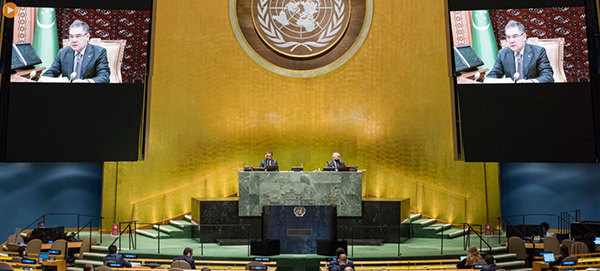
Problem of the Aral Sea Region. […] “Coronavirus pandemic has to varying degree affected many countries all over the world. However, it is especially dangerous to ecologically disadvantaged regions. Unfortunately, there are many such areas when one looks at a map and it is impossible to mention all of them during this statement. Therefore, I wish to touch upon the issue, which is of vital relevance to Central Asian states and nations. It is the Aral Sea disaster. Amidst the escalating pandemic, the situation there is worsening and threatens the lives and health of people and the risk of epidemic outbreak has considerably risen. Under these circumstances, we urge the world community to pay very close attention to the problems of the Aral Sea and the Aral Sea region. Obviously, the work is underway to address these issues. This work is substantive both through the United Nations and by other international organizations that have been providing assistance to IFAS. We thank all of these organizations and we highly appreciate their efforts. However, I wish to be frank today that it is not enough to save the Aral. There is a need for a focused approach, concrete practical assistance and meaningful support to the people living there. Therefore, we strongly believe that the subject of Aral Sea needs systematic and comprehensive approach as well as relevant legal documents; and this issue should be set aside as a separate direction of operations of the United Nations. In this regard, Turkmenistan has put forward an initiative to create a Special Program for the Aral Sea Basin. We also wish to emphasize the importance of what was adopted at our initiative in April 2018 and May 2019. I refer to General Assembly Resolutions adopted on cooperation between the United Nations and the International Fund for Saving the Aral Sea. Today these resolutions serve as a platform to consolidate joint efforts on Aral Sea issues. For the establishment of legal frameworks to address the Aral Sea issue in May 2021 during the session of UNESCAP Turkmenistan will present an initial draft of the concept and structure of the future special program on the Aral Sea. We call upon all states and relevant international organizations to consider and discuss these documents. […]”.
Peace process in Afghanistan. “[…] Our country as Afghanistan's neutral and immediate neighboring state is ready to provide necessary political and organizational conditions in our territory to establish peaceful dialogue between the Government of Afghanistan and all parties interested in political settlement of the situation in Afghanistan. We think that the key condition for political stabilization, social and economic recovery of Afghanistan, its successful integration to global economy is to implement large infrastructure projects with Afghanistan's involvement primarily in vital sectors such as energy, transport and communication. As is known, our country consistently working in this direction has initiated the construction of a gas pipeline along Turkmenistan-Afghanistan-Pakistan-India route, as well as railroads and fiber-optic communication lines with access to the territory of Afghanistan, which have already entered the stage of practical implementation. We call on the international community, business structures, and financial institutions to become more actively involved in this work. […]”.

Address by the President of the Republic of Uzbekistan
…negative developments also pose a great threat to the sustainable development of Central Asia
The President of Uzbekistan H.E. Sh. Mirziyoyev proposed to declare the Aral Sea region an area of ecological innovation and technologies, recalled the rapid desiccation of the Aral Sea and the devastating effects of climate change, talked about reforms in his country and called for joint efforts to combat COVID-19.
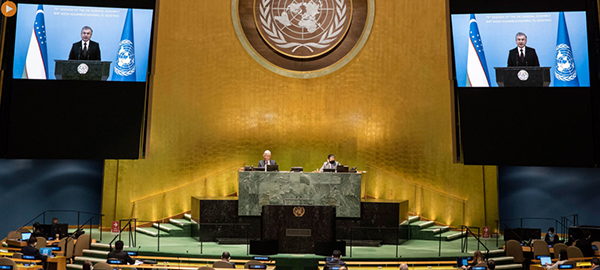
Pandemic. The Head of State proposed to develop under the UN auspices an International Code of Voluntary Commitments of States during pandemics. This document should reflect each state’s commitments to its citizens and international partners. “Such a global catastrophe has not been observed on our planet in the last hundred years. This calamity has vividly revealed humanity’s vulnerability. The current threatening and complex situation has proved that all states and peoples of the world are interconnected and that regular dialogue, trust and close cooperation among us are extremely important”.
Uzbekistan’s Modernization. Mr. Sh.Mirziyoyev spoke on “political, social and economic modernization of Uzbekistan”. “Today, the process of democratic transformations in our country has become irreversible”. The President pointed to the increasing role of women in society, noting that their number in the new parliament has doubled, spoke about projects in support of young people and called for the support of Uzbekistan's initiative to develop a UN Convention on the Rights of Youth.
Regional Cooperation. “The fundamental changes are taking place now in the region of Central Asia. […] Our common achievement is consultative summits of the Central Asian Heads of State. […]. Over the past four years, Uzbekistan’s bilateral trade with neighboring states has grown almost five-fold”. It was proposed to establish a Regional Centre for the Development of Transport and Communications under the auspices of the United Nations and to hold an International conference on the ten-year results and forthcoming prospects of the Joint Plan of the United Nations Global Anti-Terrorism Strategy, as well as organize the International Forum “Central Asia at the Crossroads of World Civilizations” in the ancient city of Khiva.
Peace Process in Afghanistan. “In order to broadly involve Afghanistan in the process of economic integration in the region, we have started the implementation of major infrastructure projects such as “Surkhan – Puli Khumri” power line and construction of a railway from Mazar-i-Sharif to the sea ports of the Indian Ocean. We believe that the issues of ensuring peace and stability in Afghanistan must remain a constant focus of the United Nations”. To this end, it was proposed to establish a permanent UN commission on economic and social development of Afghanistan.
The Aral Sea region – an area of ecological innovation and technologies. […] “Another acute problem of our time is related to global climate change. Today, every country feels the negative effects of this process. Unfortunately, such negative developments also pose a great threat to the sustainable development of Central Asia. I would like to once again draw your attention to the devastating effects of the drying up of the Aral Sea. The Aral Sea region became the center of an environmental tragedy. To mitigate the current situation, we are carrying out an enormous work to create two million hectares of new plantations and forests, to form a layer of soil. On our country’s initiative, the United Nations Multi-Partner Human Security Trust Fund for the Aral Sea Region was established. We hope that this Fund will serve as a base platform for the international community to provide practical assistance to the population living in a stressed ecological zone. We propose to adopt a special resolution of the UN General Assembly declaring the Aral Sea region an area of ecological innovation and technologies. It would be expedient to mark the date of adoption of this important document as the International Day for the Protection and Restoration of Ecosystems. […]”.
Selected Resolutions on Water, Environment and Development Adopted by the UNGA 75th Session
Declaration on the commemoration of the 75th anniversary of the United Nations (A/RES/75/1); Observance of environmental norms in the drafting and implementation of agreements on disarmament and arms control (A/RES/75/53); nternational cooperation on humanitarian assistance in the field of natural disasters, from relief to development (A/RES/75/124); United Nations Conference on the Midterm Comprehensive Review of the Implementation of the Objectives of the International Decade for Action, “Water for Sustainable Development”, 2018–2028 (A/RES/75/212); Promoting sustainable consumption and production patterns for the implementation of the 2030 Agenda, building on Agenda 21 (A/RES/75/213); Disaster risk reduction (A/RES/75/216); Protection of global climate for present and future generations of humankind (A/RES/75/217); Implementation of the United Nations Convention to Combat Desertification in Those Countries Experiencing Serious Drought and/or Desertification, Particularly in Africa (A/RES/75/218); Implementation of the Convention on Biological Diversity and its contribution to sustainable development (A/RES/75/219); Harmony with nature (A/RES/75/220); Ensuring access to affordable, reliable, sustainable and modern energy for all (A/RES/75/221); Eradicating rural poverty to implement the 2030 Agenda (A/RES/75/232).